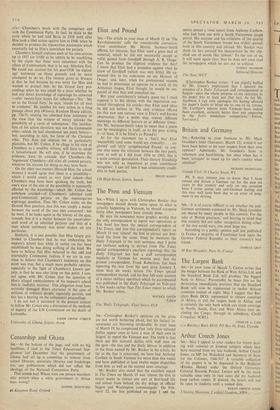Eliot and Pound
Stn,—The article in your issue of March 12 on 'The Revolutionaries' calls for considerable correction. Your contributor Mr. Martin Seymour-Smith affirms, for instance, that Eliot 'used a great deal of material, which he did not necessarily accept as valid, gained from Gurdjieff through A. R. Drage.' Can he produce the slightest evidence for this? 1 know that Eliot had a prejudice against what he knew of Gurdjieff (which was very little). He ex- pressed this in his comments on my Memoir of Orage: and, later, when for professional reasons he had to pronounce an opinion on a work of the Armenian magus, Eliot thought he would be sus- pected of that bias and consulted me.
But your contributor's unlucky guess (as I must suppose it to be) chimes with the imputation sus- tained throughout his article—that Eliot used ideas he did not believe in. The only evidence offered for this new and curious view is Eliot's well-known observation, that a poem may convey different meanings to different hearers or at different times: this Mr. Seymour-Smith takes to mean that a poem can be meaningless in itself, or to the poet writing it—at least, if it be Eliot's or Pound's!
As for the statement (as a 'fact') that Eliot 'masterfully (and some would say cynically) .. . ex- ploited' and 'slyly' complimented Pound: to any- one who knew the relations between the two poets, even as well as I did from 1934 to 1947, this is a quite comical speculation. Their literary friendship was not only as important as your contributor recognises: I can tell him it was consistently credit- able to both parties.
116 High Street, Lewes, Sussex
mime MAIRET














































 Previous page
Previous page